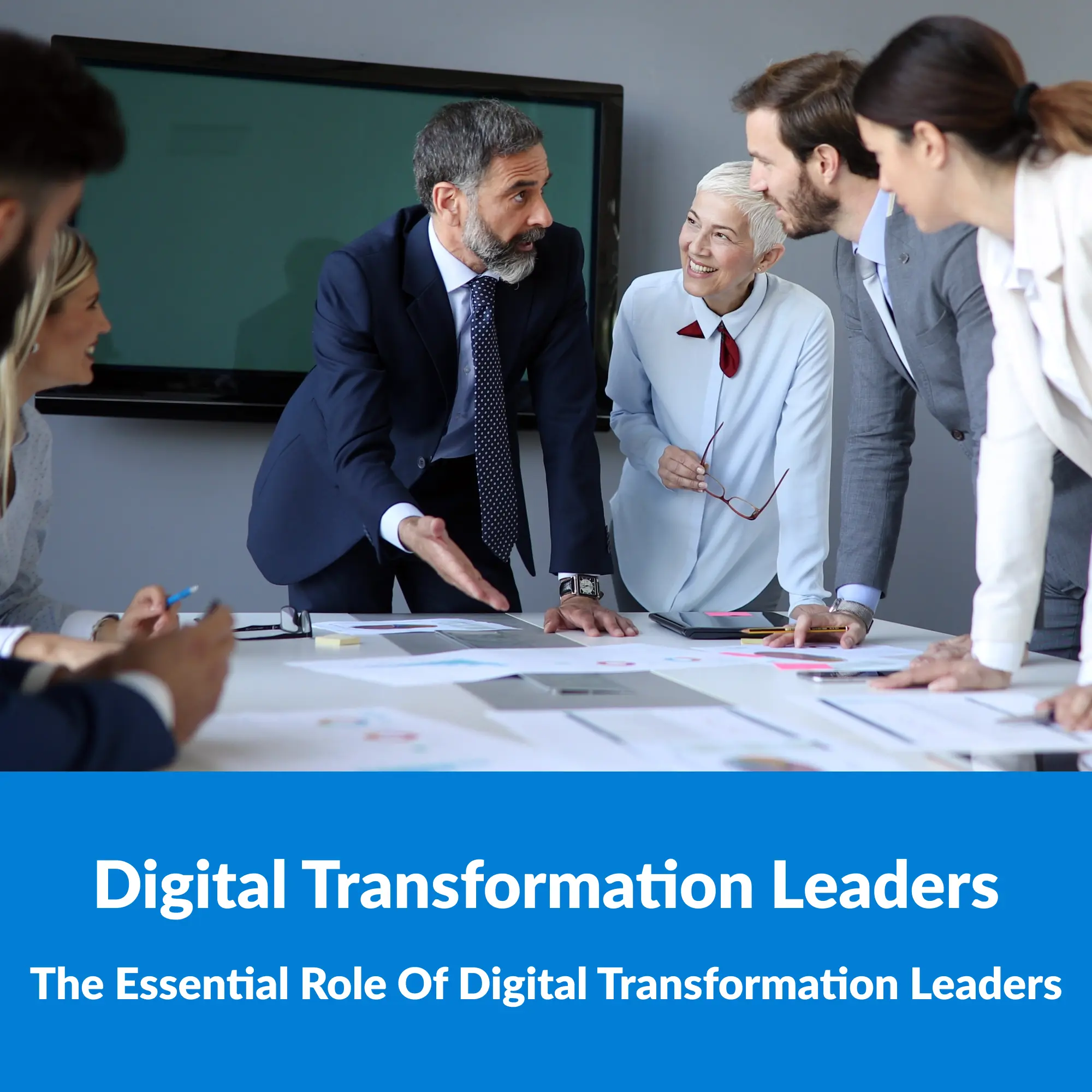The digital age is relentless.
According to a survey of over 240 C-suite executives, a staggering 75% of businesses haven’t achieved their digital transformation goals. This harsh reality highlights a critical factor: leadership. In this rapidly evolving landscape, having strong leaders at the helm is the difference between riding the wave of change or being swept away by it. By fostering a culture of innovation, embracing change, and focusing on the strategic integration of digital technologies, leaders can propel their organizations toward a future of limitless potential.
Preface: This article diverges from our usual focus on
Epilogue Opus, our digital adoption platform. We occasionally like to explore diverse subjects to provide interesting insights and perspectives. We appreciate your readership.
So, who exactly is a digital transformation leader?
A digital transformation leader emerges as the architect of change, strategically guiding an organization through the maze of technological advancement. This individual possesses a profound understanding of digital technologies and embodies the vision to leverage these tools in redefining business models, processes, and culture. The essence of their role transcends mere technological implementation, focusing on fostering a mindset of continuous innovation and resilience against the backdrop of an ever-evolving digital landscape.
Essential Leadership Skills for Digital Transformation Success
The dynamic nature of digital transformation demands a unique set of skills from leaders. These individuals must not only navigate technological advancements but also cultivate an environment that embraces change, fosters innovation, and places the customer at the center of every decision. Below, we delve into the critical skills that leaders must possess or develop to drive digital transformation effectively.
– Strategic Vision and Digital Literacy
Leaders must combine a deep understanding of digital technologies with the ability to envision how these innovations can propel the organization forward. This skill involves recognizing the potential of emerging technologies, such as artificial intelligence, blockchain, and the Internet of Things (IoT), and integrating them into the organization’s strategic plan. Leaders with strategic vision can anticipate market shifts and align digital transformation efforts with the organization’s long-term goals, ensuring resilience and competitiveness.
– Agile Decision-Making and Adaptability
The rapid pace of digital change requires leaders to be agile in their decision-making processes. They must be able to quickly assess situations, make informed decisions, and pivot strategies as needed. This agility is complemented by adaptability—the capacity to embrace change and lead the organization through uncharted territories. Leaders who excel in these areas can navigate the complexities of digital transformation, responding swiftly to challenges and opportunities alike.
– Effective Communication and Stakeholder Engagement
Clear, transparent communication is essential for rallying the organization around the digital vision. Leaders must articulate the purpose and benefits of digital transformation initiatives, addressing concerns and building consensus among stakeholders. This skill extends to engaging with employees, customers, and partners, ensuring all parties are informed, involved, and motivated.
Utilizing
digital adaptation platforms can significantly enhance this process, serving as a bridge between technology and business. These platforms offer interactive tools that simplify complex digital concepts for all stakeholders, fostering a deeper understanding and alignment with the organization’s digital strategy. By effectively leveraging such platforms, leaders can maintain a continuous dialogue, encourage collaboration, and secure buy-in from all involved, ensuring a unified approach to the transformation journey.
– Empowering Leadership and Talent Development
Digital transformation is as much about people as it is about technology. Leaders must empower their teams, fostering a culture where innovation, collaboration, and risk-taking are encouraged. This involves identifying and nurturing talent, providing opportunities for skill development, and creating a supportive environment where employees are encouraged to experiment and learn. By investing in their teams, leaders build a resilient workforce capable of driving and sustaining digital innovation.
– Customer-centric Innovation:
Leaders must prioritize customer-centric innovation, using digital tools to gather insights into customer preferences and behaviors to ensure that digital transformation efforts translate into enhanced customer value and loyalty.
– Resilience and Risk Management
Digital transformation involves navigating uncertainties and embracing risks as opportunities for growth. Leaders must exhibit resilience, maintaining focus and momentum in the face of setbacks. This resilience is paired with an astute ability to manage risks, identifying potential challenges early and developing strategies to mitigate them.
Five Leading Figures in Digital Transformation
Stay ahead of the curve by learning from the best. Here are a few influential digital transformation leaders worth following, along with their key accomplishments:
When Nadella took the helm at Microsoft in 2014, the company was facing a decline in its core PC software business. Nadella spearheaded a bold transformation strategy, shifting Microsoft’s focus towards cloud computing and subscription services.
Under his leadership, Microsoft developed Azure, a leading cloud platform competitor to Amazon Web Services. He also championed a more collaborative culture within Microsoft, fostering innovation and leading to the development of groundbreaking products like Microsoft Teams.
During her tenure as CEO from 2012 to 2020, Rometty recognized the transformative potential of artificial intelligence (AI) and cloud computing. She led IBM’s historic $34 billion acquisition of Red Hat, a major player in open-source cloud software.
This move positioned IBM as a leader in the hybrid cloud space, allowing businesses to seamlessly integrate on-premises data centers with public cloud services. Rometty’s vision for a “cognitive business” era, where AI is used to automate tasks and gain valuable insights, continues to shape IBM’s strategy today.
Banga has been at the forefront of Mastercard’s digital transformation journey, recognizing the rise of cashless transactions and the importance of cybersecurity in the digital payments landscape. He has overseen strategic acquisitions like Vocalink, a leader in real-time payments technology, and launched initiatives like Mastercard Start Path, which helps early-stage fintech companies develop innovative solutions.
Under Banga’s leadership, Mastercard has become a global leader in digital payments, constantly innovating to provide secure and convenient payment experiences for consumers and businesses alike.
Herd co-founded Bumble in 2014, a dating app that flips the script on traditional gender roles. Bumble requires women to make the first move, fostering a more respectful and empowering online dating experience. Herd has leveraged technology to not only connect people but also create a positive social impact.
Bumble has partnered with organizations like the American Civil Liberties Union (ACLU) to promote healthy relationships and empower women. Herd’s innovative approach to online dating and her commitment to social responsibility make her a role model for purpose-driven digital leadership.
A true visionary, Benioff has revolutionized the customer relationship management (CRM) industry with Salesforce, a cloud-based CRM platform. He recognized the limitations of traditional on-premise software and pioneered the software-as-a-service (SaaS) model, making CRM software more accessible and affordable for businesses of all sizes.
Benioff is also a vocal advocate for corporate social responsibility, encouraging businesses to use technology to create positive change in the world. Salesforce’s innovative culture and Benioff’s commitment to both business success and social good make him a leading figure in the digital transformation landscape.
In conclusion,
In conclusion, digital transformation is a marathon, not a sprint. Leaders who possess the vision, skills, and commitment to guide their organizations through this journey are the ones who will unlock the immense potential of the digital age. By understanding the critical role of leadership and continuously developing the required skillset, businesses can navigate the ever-changing digital landscape and emerge stronger on the other side.










